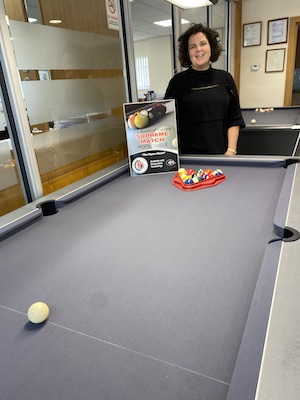There are, apparently, close on to 50,000 pool tables in operation in the UK today.

That is down from as many as 70,000 in 1996, due to the contraction in the pubs business. Of those, most are now turning over to cashless payment systems and some of them are reporting cashboxes rising by as much as 300 per cent as a result.
The latter statistic comes from Britain’s largest coin-op pool table producer, Heywood Pool and Snooker, whose operations manager, Laura Martin, told us that around 60 per cent of the company’s current production is of the pay-to-play variety.
That statistic does not of course include those tables located in other sites, notably arcades and FECs, so the actual numbers are likely to be significantly higher, but it demonstrates the longevity of a product that exploded on to the British coin-op scene in the 1980s and has become a staple.
The product remains very stable. “A good pool table is a better investment than a Category C gaming machine,” said Laura. “It will last infinitely longer and will earn steadily for many years. We have tables that have come back to us after many years and with a counter in them it can show 30,000 plays. At £1 a game, that is a wonderful investment, especially as it would have been bought for perhaps £700 originally.”
Heywood’s products sell under the Supreme Pool brand. The company was founded by David Hallworth in 1984, but he had been in the business before that.
Laura has been his “right hand man” for 21 years, having come to the company as a student seeking income to support her studies. “I have a degree in criminology,” she said, “but stayed in the pool table business.”
Heywood, based in the small town with the same name just outside of Rochdale, is now the biggest producer-supplier in the UK, making its tables totally in-house from a modern, purpose-built factory. The market has changed significantly in the past three years, reported Laura.
“Pre-covid it was mainly the home games market that we supplied, but now the balance has shifted over to coin-op, except that the majority are now electronic. We supply them that way and operators configure them to their own in-house cashless system.”
The company competes in the market with DPT and Optima, while Billares Sam of Spain supplies the large-ball US pool sector.
“English pool, as it is known,” said Martin, “still takes up 90 per cent of the British market, mostly with 7ft by 4ft tables.”
The well-proven Aramith balls are supplied on slate-bed tables covered by West of England or Strachan cloth. The mechanisms can be Essex slide models, or electronic, or indeed, both.
“Most of the demand now is for electronic validation,” said Laura. “Some sites, like universities, are pretty well exclusively electronic and the reason for the dominance of this type of validation is shown by an improved cash box. We have seen figures that suggest an electronic mechanism will improve the cash box by 300 per cent.”
Price of play varies enormously, depending upon the site and the part of the country. “In London and the south it can be £3 a game, but in some parts of the north as little as 50p or £1.”
Pool tournaments are still played on a national level and for substantial prizes - and TV coverage comes from programmes such as Ultimate Pool. But coin-op models are generally used and they are supplied by Heywood. “They use our new Match table,” she said. It had encouraged a new interest in table sports and similar “live” competitions.
Pictured is Laura Martin with Heywood Pool’s latest Supreme model.

